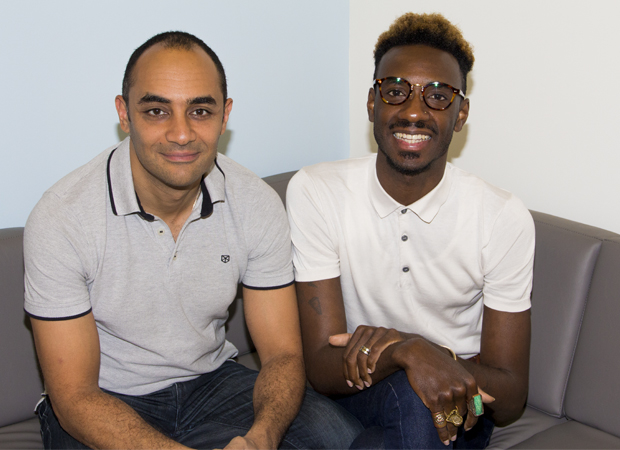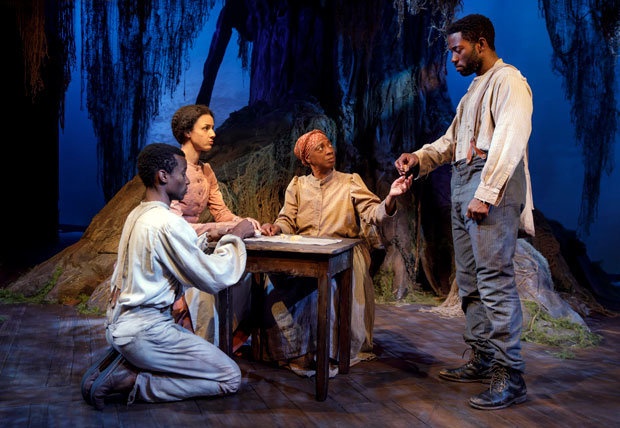Playwright Donja R. Love and Director Saheem Ali Explore the Black, Queer Experience
Love debuts two plays from his new trilogy this season, with the first, ”Sugar in Our Wounds”, currently running at Manhattan Theatre Club.
Playwright Donja R. Love is on the precipice of exploding onto the theater scene. In less than six months, Love will have had two of his biggest productions to date, the first two parts of a new trilogy that explores queer love at pivotal moments in African-American history.
The first part, presented by Manhattan Theatre Club, is currently running. Sugar in Our Wounds explores the sudden, passionate relationship between two slaves during the Civil War. Fireflies, which begins performances September 26 at Atlantic Theater Company, is set in the Jim Crow South, in the wake of the Birmingham church bombing that killed four little girls. A third, the currently unproduced In the Middle, takes place during the Black Lives Matter movement.
Joining Love on the whole journey is director Saheem Ali, who remembers being blown away when he first read Love's work. They felt "so revolutionary and so matter-of-fact at the exact same moment," Ali explains. And audiences feel the same way.

(© David Gordon)
How did you get into your respective professions?
Donja R. Love: I thought I was going to be an actor, until I realized that is not a part of my ministry at all. I was in it for the vanity and not for the reverence of the character and the story. It hit me that writing is something that aligned with my purpose in December 2008, when I found out I was HIV-positive. I was able to navigate through that through writing. I started to realize that this is what writing does. It can heal, it can save. I always knew that theater and the arts was part of the journey that I wanted to be on, but it took this large force of life to help me realize the actual path.
Saheem Ali: When I was in high school in Kenya, my dad was a pilot, so I was able to go with him to London where I saw a production of Grease. It was the first time I'd seen a big-scale musical. I was so blown away by it. When I got back to Kenya, I put the show up myself, which meant writing the script from memory. At the time, I didn't know that a film existed. I had the cassette of songs, so I found words to string the songs together. I didn't realize that I was basically directing the show. When I came to the States, I was a computer science major because my parents wouldn't let me study theater. I had to study theater on the sly. I wanted to be an actor, too, at that point, but I remembered how much I enjoyed putting something together, so I drifted more toward directing.
And how did you come to work together?
Saheem: Donja had a fellowship at the Playwrights Realm, and the literary manager there reached out and said, "We have a fellow here who has a play I want you to read." It was Sugar in Our Wounds. I was blown away.
Donja: Saheem and I skyped because you were in Detroit working on a show. One of the things that resonated with me was that he was in the middle of tech and not only took time out to read the play, but came to the conversation with his thoughts and ideas and his vision. We all know that tech can be super-duper crazy, but this was a man who was able to carve out time and bring love. I thought, this is someone who I want in my circle.

(© Joan Marcus)
Sugar in Our Wounds is the start of a trilogy. What was your impetus to write this particular play, and this series?
Donja: I read Tarell Alvin McCraney's Marcus; or The Secret of Sweet, and there was a passage where Shanta, one of the characters, was probing Marcus, the main character, trying to figure out his sexuality. One of the things she says is that she remembers hearing what slave masters would do to the enslaved males when he found out they were intimate. It blew my mind because I never imagined me or anyone like me existing at that time. You always think that Marsha P. Johnson and Stonewall is the first time we came to be, not really thinking about how vast and rich queer history is.
In January 2016, I started to write Sugar. Around May or June, my husband and I were walking to the grocery store and talking about it, and I said, "I think this play is part of a trilogy that explores queer love at pivotal moments in black history." He stopped in his tracks. We started to talk, and I started getting more and more invested in this idea of exploring queerness during moments where I never imagined queer narratives existing.
Saheem: Sugar felt so revolutionary and so matter-of-fact at the exact same moment. Revolutionary because I'd never seen or heard anything like it. I couldn't contemplate why I had never heard of those narratives, but as we got deeper into Sugar, we realized that it's just really hard to find those stories.
One of the things I love about the trilogy is how the plays connect thematically, but they all stand alone in their own right. In some of them, there are references to other characters being ancestors, but they don't intertwine in a way that you have to see all of them to understand.
How much work did you do with Manhattan Theatre Club to make sure the audience was as diverse in race and age as it possibly could be?
Donja: Whenever I write, I know the characters I'm writing about and the people I'm writing for, so I wanted to make sure, particularly for a play like Sugar, that individuals who would truly see themselves reflected in the work would be there to see it. We sent a very honest email of "This is why I wrote the play, this is who I would like to come see the play, and this is who the play is for, on top of everyone else." MTC has been extremely open arms, really helping out, working on black theater nights and pride nights. I've been super-duper grateful.
Saheem: It's expanded the sense of who's welcome in the theater and who's invited there. Historically, this is a unique moment for MTC, and they've really embraced the story and Donja. They wanted to serve the play and playwright as best they could. They brought people on board just to make sure they were reaching out to the right communities. It's been glorious being in that space with all kinds of people, and feeling what the effect is every night.
Donja: And feeling as if this moment has been ordained. Previews and opening happening during Pride. Opening night literally happening on Juneteenth, when slaves in Texas found out they were free. It was like…This is actually meant to be. It's beautiful.








